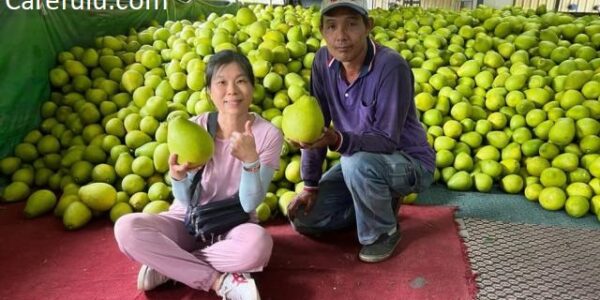The farmers caught up in Taiwan’s tensions with China – farmers caught up in Taiwan’s tensions with China
Fruit farmer Wu Cheng-wan says the ban from China came at exactly the wrong time.
This year I was very cautious, he says. I was especially afraid because the lack of rain and drought disrupted growth, and then political circumstances led China to cut off orders, so we can’t sell our pomelos.
A pomelo is a large citrus fruit that is similar to a grapefruit but with a sweeter flavor.
Back in early September, the orchards around the small town of Ruisui on Taiwan’s east coast were laden with the fruit.
The pomelos were due to be picked ahead of the Mid-Autumn Festival, which was celebrated in Taiwan and mainland China this year on 10 September. This is a harvest festival slightly analogous to US Thanksgiving, and the fruit is traditionally eaten as part of the celebrations.
Yet this year Mr. Wu, one of the local farmers, says that many of his neighbors gave up trying to sell their crops after a sharp drop in prices.

This came after the Chinese government in Beijing announced in August that it would be banning imports of Taiwanese pomelos, a move widely seen as a way to punish Taiwan for receiving a visit that month from leading US politician Nancy Pelosi, the Speaker of the United States House of Representatives.
The background to this is that, while self-ruled Taiwan sees itself as distinct from the Chinese mainland, with its own democratically-elected government, Beijing sees the island as a breakaway province that will eventually be under its control.
China and Taiwan: A really simple guide
Farmers in Ruisui usually export 70% of their pomelos to mainland China, so Mr. Wu says the ban will make it difficult for everyone to cover costs such as fertilizer and labor.
The month before the Mid-Autumn Festival, the market was already saturated, so when it was our turn to harvest pomelos in Ruisui it was too late as the price had already dropped, he adds.
This year’s Chinese market ban came quickly, so it was too late to find a new market and too late to react.
While Alicia Garcia Herrero, chief economist for the Asia Pacific at the investment bank Natixis, says that China’s ban on Taiwanese pomelos is not a big issue for Taiwan, it has to be seen in the context of it being just one of many prohibitions that Beijing put in place last month.
In total, China blocked imports of more than 2,000 different Taiwanese foodstuffs, from fish and seaweed to cooking oils, cakes, and other fruits. This followed after previous bans of Taiwanese pineapples, and both wax and sugar apples tropical fruits that don’t look or taste like apples.
Taken all together, it highlights the potentially precarious nature of Taiwan’s economic relationship with the mainland.
China is far and away Taiwan’s biggest trading partner, and last year was the destination for 42% of Taiwanese exports, compared to the 15% that went to the US.
In the opposite direction, 22% of Taiwan’s imports come from China, with only 10% from the US.
Much of Taiwan’s trade with China is concentrated around Taiwan’s electronics and semiconductor industry, which is deeply intertwined with China’s tech industry, but DBS Bank economist Ma Tieying says farmers and food companies are particularly exposed to import bans.
This is because, unlike Taiwan’s tech exports, they are easy to ban without it having any impact on China’s own manufacturing. Separately, China has 2019 banned people from going to Taiwan on holiday.
Going forward, whether Beijing will roll out more restriction measures need to be closely watched, says Ms. Ma.
There is the risk for Beijing to expand import bans on some low-end Taiwanese manufacturing goods such as footwear and wood. In these sectors, Taiwan has a high reliance on China for export sales, while China has low reliance on Taiwan for import supply.
Christina Lai, a junior research fellow at the Institute of Political Science at Academia Sinica, Taiwan’s top research institution, says that Taiwanese farmers are looking for new buyers in Japan, Australia, and the Middle East, but that this will take time.
It is unclear how long China’s ban on tropical fruits and tourists will last, but Taiwan’s diversification strategies for its agricultural industry will certainly continue, says Ms. Lai. It might take several years for Taiwan’s farmers to make needed structural adjustments and sector reforms.
She adds that It might be time for Taiwan’s wider business community to also diversify beyond China. Meanwhile, other analysts have started to worry that China might try to blockade Taiwan in the future, as relations between the two sides fall to some of their lowest points in 25 years.

Back on Taiwan’s rural east coast, a lot of those worries seem a ways away, trumped by the prevailing.
At Mr. Wu’s farm, people still needed to harvest his pomelo bushes. Even with expenses collapsing, the fruit nonetheless needed to be picked because if it’s far left to rot it will harm the encircling soil and convey pests.
Mr. Wu and his spouse hope Taiwan can locate new export markets, but also new uses for pomelo, which remains taken into consideration as seasonal fruit. He also wishes subsidies from the authorities to now not simply assist shoppers but additionally go directly to farmers like himself.
The authorities have been announcing that the united states of America are built on agriculture, however farmers are fast being overwhelmed to dying, he says.


 For all latest news, follow The carefulu Google News channel.
For all latest news, follow The carefulu Google News channel.





